 Speed Up Your FrenchSpeed Up Your French is a unique and innovative resource that identifies and explains the errors most commonly made by students of French. From false friends to idiomatic expressions and the use of prepositions, each of the nine chapters focuses on an aspect of the language where English speakers typically make mistakes. Full explanations are provided throughout with clear, comprehensive examples, enabling students to acquire a surer grasp of French vocabulary and idiom, as well as grammar. Key features: carefully selected grammar topics and examples based on the most commonly made errors extensive exercises and answer key to reinforce learning, link theory to practice and promote self-study use of mnemonic devices, including illustrations, to aid understanding supplementary exercises and answer key available at www.routledge.com/cw/jubb. Suitable for either classroom use or self-study, Speed Up Your French is the ideal resource for all intermediate learners of French wishing to refine their language skills. Speed Up Your Language Skills SERIES EDITOR: Javier Muoz-Basols, University of Oxford, UK The Speed Up Your Language Skills series publishes innovative, high-quality textbooks focusing on common errors as an effective tool to improve ones skills in a foreign language. Speed Up Your Language Skills SERIES EDITOR: Javier Muoz-Basols, University of Oxford, UK The Speed Up Your Language Skills series publishes innovative, high-quality textbooks focusing on common errors as an effective tool to improve ones skills in a foreign language.
Speed Up Your FrenchSpeed Up Your French is a unique and innovative resource that identifies and explains the errors most commonly made by students of French. From false friends to idiomatic expressions and the use of prepositions, each of the nine chapters focuses on an aspect of the language where English speakers typically make mistakes. Full explanations are provided throughout with clear, comprehensive examples, enabling students to acquire a surer grasp of French vocabulary and idiom, as well as grammar. Key features: carefully selected grammar topics and examples based on the most commonly made errors extensive exercises and answer key to reinforce learning, link theory to practice and promote self-study use of mnemonic devices, including illustrations, to aid understanding supplementary exercises and answer key available at www.routledge.com/cw/jubb. Suitable for either classroom use or self-study, Speed Up Your French is the ideal resource for all intermediate learners of French wishing to refine their language skills. Speed Up Your Language Skills SERIES EDITOR: Javier Muoz-Basols, University of Oxford, UK The Speed Up Your Language Skills series publishes innovative, high-quality textbooks focusing on common errors as an effective tool to improve ones skills in a foreign language. Speed Up Your Language Skills SERIES EDITOR: Javier Muoz-Basols, University of Oxford, UK The Speed Up Your Language Skills series publishes innovative, high-quality textbooks focusing on common errors as an effective tool to improve ones skills in a foreign language.
Such errors are often either driven by linguistic transfer from English or caused by common misperceptions about the grammatical structure of a foreign language. The primary objectives of the series are to explain and illustrate in context the most common errors made by English-speaking students in a foreign language and to classify them in easy-to-reference categories. Students can thus learn the appropriate usage of words and expressions and understand the reasons why they persistently make the same mistakes. The inclusion of exercises, shortcuts, mnemonic devices and much-needed strategies, not usually seen in conventional grammar books, facilitates vocabulary acquisition and mastery of essential grammatical elements. Books in the series are intended as primary or supplementary texts at the intermediate and advanced levels. Available titles in the series:Speed up your Arabic Sebastian Maisel Speed up your Chinese Shin Yong Robson Speed up your French Margaret Jubb Speed up your Korean Lucien Brown and Jaehoon Yeon Speed up your Spanish Javier Muoz-Basols, Marianne David and Olga Nez Pieiro Speed Up Your FrenchStrategies to avoid common errors Margaret Jubb  First published 2016 by Routledge 2 Park Square, Milton Park, Abingdon, Oxon OX14 4RN and by Routledge 711 Third Avenue, New York, NY 10017 Routledge is an imprint of the Taylor & Francis Group, an informa business 2016 Margaret Jubb The right of Margaret Jubb to be identified as author of this work has been asserted by her in accordance with sections 77 and 78 of the Copyright, Designs and Patents Act 1988. Available titles in the series:Speed up your Arabic Sebastian Maisel Speed up your Chinese Shin Yong Robson Speed up your French Margaret Jubb Speed up your Korean Lucien Brown and Jaehoon Yeon Speed up your Spanish Javier Muoz-Basols, Marianne David and Olga Nez Pieiro Speed Up Your FrenchStrategies to avoid common errors Margaret Jubb
First published 2016 by Routledge 2 Park Square, Milton Park, Abingdon, Oxon OX14 4RN and by Routledge 711 Third Avenue, New York, NY 10017 Routledge is an imprint of the Taylor & Francis Group, an informa business 2016 Margaret Jubb The right of Margaret Jubb to be identified as author of this work has been asserted by her in accordance with sections 77 and 78 of the Copyright, Designs and Patents Act 1988. Available titles in the series:Speed up your Arabic Sebastian Maisel Speed up your Chinese Shin Yong Robson Speed up your French Margaret Jubb Speed up your Korean Lucien Brown and Jaehoon Yeon Speed up your Spanish Javier Muoz-Basols, Marianne David and Olga Nez Pieiro Speed Up Your FrenchStrategies to avoid common errors Margaret Jubb  First published 2016 by Routledge 2 Park Square, Milton Park, Abingdon, Oxon OX14 4RN and by Routledge 711 Third Avenue, New York, NY 10017 Routledge is an imprint of the Taylor & Francis Group, an informa business 2016 Margaret Jubb The right of Margaret Jubb to be identified as author of this work has been asserted by her in accordance with sections 77 and 78 of the Copyright, Designs and Patents Act 1988.
First published 2016 by Routledge 2 Park Square, Milton Park, Abingdon, Oxon OX14 4RN and by Routledge 711 Third Avenue, New York, NY 10017 Routledge is an imprint of the Taylor & Francis Group, an informa business 2016 Margaret Jubb The right of Margaret Jubb to be identified as author of this work has been asserted by her in accordance with sections 77 and 78 of the Copyright, Designs and Patents Act 1988.
All rights reserved. No part of this book may be reprinted or reproduced or utilised in any form or by any electronic, mechanical, or other means, now known or hereafter invented, including photocopying and recording, or in any information storage or retrieval system, without permission in writing from the publishers. Trademark notice: Product or corporate names may be trademarks or registered trademarks, and are used only for identification and explanation without intent to infringe. British Library Cataloguing-in-Publication Data A catalogue record for this book is available from the British Library Library of Congress Cataloging-in-Publication Data Names: Jubb, Margaret A. Title: Speed up your French : strategies to avoid common errors / Margaret Jubb. Description: Milton Park, Abingdon, Oxon ; New York, NY : Routledge, [2016] | Series: Speed up your Language Skills | Includes bibliographical references and index.
Identifiers: LCCN 2015035056| ISBN 9781138849990 (hardback : alk. paper) | ISBN 9781138850002 (pbk. : alk. paper) | ISBN 9781315725062 (ebook) Subjects: LCSH: French languageGrammarProblems, exercises, etc. | French language--Errors in usage. | French languageTextbooks for foreign speakersEnglish.
Classification: LCC PC2460 .J83 2016 | DDC 448.2/421dc23 LC record available at http://lccn.loc.gov/2015035056 ISBN: 978-1-138-84999-0 (hbk) ISBN: 978-1-138-85000-2 (pbk) ISBN: 978-1-315-72506-2 (ebk) Typeset in Swiss 721 and Zapf Calligraphic by Florence Production Ltd, Stoodleigh, Devon, UK Additional materials are available on the companion website at www.routledge.com/cw/jubb Contents This book is intended for English-speaking students, either at secondary school or at university, who have attained an intermediate level in French. It is designed primarily as a guide for self-learning, though it could also be used as a supplement to classroom materials, both for intermediate-level students and for more advanced students who need to revise particular areas of the language. It focuses on the aspects of foreign language, such as false friends, idiomatic expressions, and the use of prepositions that typically cause English speakers difficulty in their production and understanding of French. The aim is to enable students to identify, understand and overcome their errors in order to become more competent and confident language users with a surer grasp of vocabulary and idiom, as well as grammar. The illustrative examples that accompany the sections of explanation are as important as the explanations themselves in encouraging students to break old connections based on false analogies with English and form new connections and associations with other related French expressions. Students will develop their own learning strategies through active engagement with the material in the book, but at particular points mnemonic devices are suggested, both for immediate support and in the hope that they will encourage the creation of other self-tailored devices.
Throughout the book, it is emphasised that the examples given can rarely be exhaustive, and students are advised, when appropriate, to consult a good bilingual dictionary or a reference grammar to further their independent learning. Active learning is promoted by the extensive exercises and answer key for self-checking. In each chapter, the final exercise takes the form of a continuous text with gaps to be filled. Unlike the earlier sentence-based exercises, each of which relates to a particular section or sections of a chapter, this final exercise covers the whole chapter and serves as a revision tool. It would be impossible to cover in a single book every type of common error, so a selection has necessarily had to be made. The author has deliberately decided not to write a revision grammar, but rather to follow the precedent set by the Spanish volume in the
Next page


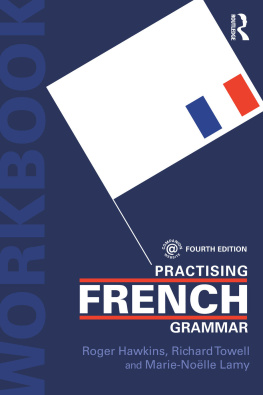
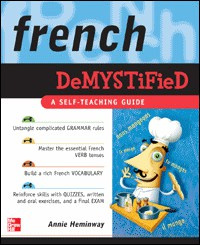
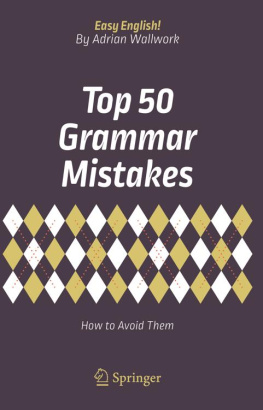
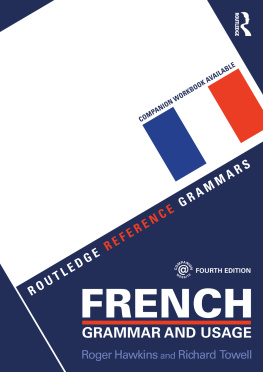

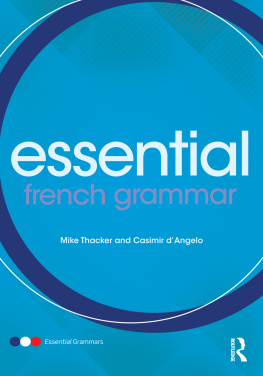
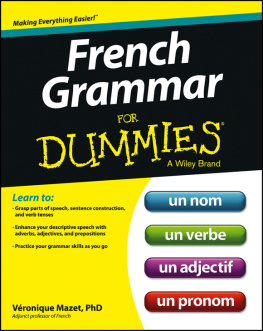
 Speed Up Your FrenchSpeed Up Your French is a unique and innovative resource that identifies and explains the errors most commonly made by students of French. From false friends to idiomatic expressions and the use of prepositions, each of the nine chapters focuses on an aspect of the language where English speakers typically make mistakes. Full explanations are provided throughout with clear, comprehensive examples, enabling students to acquire a surer grasp of French vocabulary and idiom, as well as grammar. Key features: carefully selected grammar topics and examples based on the most commonly made errors extensive exercises and answer key to reinforce learning, link theory to practice and promote self-study use of mnemonic devices, including illustrations, to aid understanding supplementary exercises and answer key available at www.routledge.com/cw/jubb. Suitable for either classroom use or self-study, Speed Up Your French is the ideal resource for all intermediate learners of French wishing to refine their language skills. Speed Up Your Language Skills SERIES EDITOR: Javier Muoz-Basols, University of Oxford, UK The Speed Up Your Language Skills series publishes innovative, high-quality textbooks focusing on common errors as an effective tool to improve ones skills in a foreign language. Speed Up Your Language Skills SERIES EDITOR: Javier Muoz-Basols, University of Oxford, UK The Speed Up Your Language Skills series publishes innovative, high-quality textbooks focusing on common errors as an effective tool to improve ones skills in a foreign language.
Speed Up Your FrenchSpeed Up Your French is a unique and innovative resource that identifies and explains the errors most commonly made by students of French. From false friends to idiomatic expressions and the use of prepositions, each of the nine chapters focuses on an aspect of the language where English speakers typically make mistakes. Full explanations are provided throughout with clear, comprehensive examples, enabling students to acquire a surer grasp of French vocabulary and idiom, as well as grammar. Key features: carefully selected grammar topics and examples based on the most commonly made errors extensive exercises and answer key to reinforce learning, link theory to practice and promote self-study use of mnemonic devices, including illustrations, to aid understanding supplementary exercises and answer key available at www.routledge.com/cw/jubb. Suitable for either classroom use or self-study, Speed Up Your French is the ideal resource for all intermediate learners of French wishing to refine their language skills. Speed Up Your Language Skills SERIES EDITOR: Javier Muoz-Basols, University of Oxford, UK The Speed Up Your Language Skills series publishes innovative, high-quality textbooks focusing on common errors as an effective tool to improve ones skills in a foreign language. Speed Up Your Language Skills SERIES EDITOR: Javier Muoz-Basols, University of Oxford, UK The Speed Up Your Language Skills series publishes innovative, high-quality textbooks focusing on common errors as an effective tool to improve ones skills in a foreign language. First published 2016 by Routledge 2 Park Square, Milton Park, Abingdon, Oxon OX14 4RN and by Routledge 711 Third Avenue, New York, NY 10017 Routledge is an imprint of the Taylor & Francis Group, an informa business 2016 Margaret Jubb The right of Margaret Jubb to be identified as author of this work has been asserted by her in accordance with sections 77 and 78 of the Copyright, Designs and Patents Act 1988. Available titles in the series:Speed up your Arabic Sebastian Maisel Speed up your Chinese Shin Yong Robson Speed up your French Margaret Jubb Speed up your Korean Lucien Brown and Jaehoon Yeon Speed up your Spanish Javier Muoz-Basols, Marianne David and Olga Nez Pieiro Speed Up Your FrenchStrategies to avoid common errors Margaret Jubb
First published 2016 by Routledge 2 Park Square, Milton Park, Abingdon, Oxon OX14 4RN and by Routledge 711 Third Avenue, New York, NY 10017 Routledge is an imprint of the Taylor & Francis Group, an informa business 2016 Margaret Jubb The right of Margaret Jubb to be identified as author of this work has been asserted by her in accordance with sections 77 and 78 of the Copyright, Designs and Patents Act 1988. Available titles in the series:Speed up your Arabic Sebastian Maisel Speed up your Chinese Shin Yong Robson Speed up your French Margaret Jubb Speed up your Korean Lucien Brown and Jaehoon Yeon Speed up your Spanish Javier Muoz-Basols, Marianne David and Olga Nez Pieiro Speed Up Your FrenchStrategies to avoid common errors Margaret Jubb